

Protogaea (1690-1691) [Pr p12] §1.
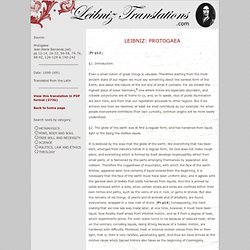
Introduction. Even a small notion of great things is valuable. Therefore starting from the most ancient state of our region we must say something about the earliest form of the Earth, and about the nature of the soil and of what it contains. For we inhabit the highest place of lower Germany,1 one where mines are especially abundant; and notable conjectures are at home to us, and, so to speak, rays of public illumination are born here, and from that our reputation proceeds to other regions. . §2. It is believed by the wise that the globe of the earth, like everything that has been born, emerged from nature's hands in a regular form; for God does not make rough plans, and everything which is formed by itself develops imperceptibly either from small parts, or is fashioned by the parts arranging themselves by separation and collision. [Pr p26] §6 From where did the water come that covers the Earth and what happened to it? [Pr p56] [Pr p74] [Pr p84] [Pr p88]
Diogenes Laertius, Lives of the Philosophers, translated by C.D. Yonge. List of unsolved problems in philosophy. This is a list of some of the major unsolved problems in philosophy.

Clearly, unsolved philosophical problems exist in the lay sense (e.g. Oráculo manual y arte de prudencia. The First Dialogue. Berkeley, George. 1909-14. Three Dialogues Between Hylas and Philonous in Opposition to Sceptics and Atheists. The Harvard Classics. Ludwik Fleck. Ludwik Fleck (July 11, 1896 – June 5, 1961) was a Polish Israeli medical doctor and biologist who developed in the 1930s the concept of Denkkollektiv (or thought collectives).
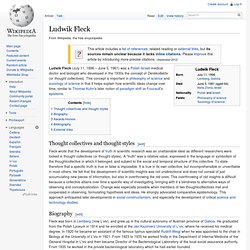
This concept is important in philosophy of science and sociology of science in that it helps explain how scientific ideas change over time, similar to Thomas Kuhn's later notion of paradigm shift or Foucault's episteme. Thought collectives and thought styles[edit] Fleck wrote that the development of truth in scientific research was an unattainable ideal as different researchers were locked in thought collectives (or thought-styles).
A "truth" was a relative value, expressed in the language or symbolism of the thoughtcollective in which it belonged, and subject to the social and temporal structure of this collective. To state therefore that a specific truth is true or false is impossible. Biography[edit] Two Dogmas of Empiricism. Willard Van Orman Quine Originally published in The Philosophical Review 60 (1951): 20-43.
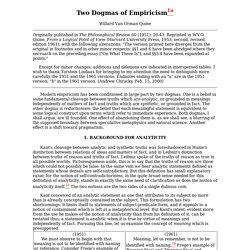
Reprinted in W.V.O. Quine, From a Logical Point of View (Harvard University Press, 1953; second, revised, edition 1961), with the following alterations: "The version printed here diverges from the original in footnotes and in other minor respects: §§1 and 6 have been abridged where they encroach on the preceding essay ["On What There Is"], and §§3-4 have been expanded at points. " Except for minor changes, additions and deletions are indicated in interspersed tables. I wish to thank Torstein Lindaas for bringing to my attention the need to distinguish more carefully the 1951 and the 1961 versions. Modern empiricism has been conditioned in large part by two dogmas. Kant's cleavage between analytic and synthetic truths was foreshadowed in Hume's distinction between relations of ideas and matters of fact, and in Leibniz's distinction between truths of reason and truths of fact.
Is analytic.4a 7b Notes. Video. Self-Reliance. Heidegger reading Hölderlins Hymne The Ister. Anthony Quinton on Spinoza and Leibniz: Section 4. Leibniz- Discourse on Metaphysics. By G W Leibniz I: Concerning the divine perfection and that God does everything in the most desirable way II: Against those who hold that there is in the works of God no goodness, or that the principles of goodness and beauty are arbitrary III: Against those who think that God might have made things better than he has IV: That love for God demands on our part complete satisfaction with and acquiescence in that which he has done.
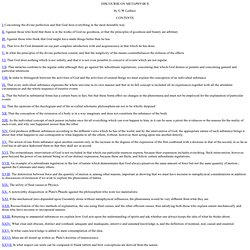
On the Fourfold Root of the Principle of Sufficient Reason. THIS treatise on Elementary Philosophy, which first appeared in the year 1813, when it procured for me the degree of doctor, afterwards became the substructure for the whole of my system.
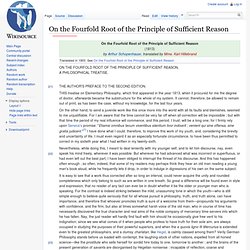
It cannot, therefore, be allowed to remain out of print, as has been the case, without my knowledge, for the last four years. On the other hand, to send a juvenile work like this once more into the world with all its faults and blemishes, seemed to me unjustifiable. For I am aware that the time cannot be very far off when all correction will be impossible ; but with that time the period of my real influence will commence, and this period, I trust, will be a long one, for I firmly rely upon Seneca's promise: "Etiamsi omnibus tecum viventibus silentium livor indixerit ; venient qui sine offensa, sine gratia judicent. Nevertheless, while doing this, I meant to deal leniently with my younger self, and to let him discourse, nay, even speak his mind freely, wherever it was possible.
September, 1847. § 1. 17641-8. Spinoza. Documentary Spinoza. A Theologico-Political Treatise - Spinoza - Philosophy Archive. Spinoza and Einstein. Repository of texts written by Michel Foucault.